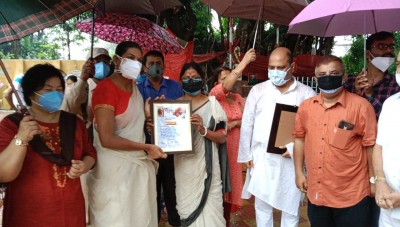
Silchar, Amidst the Covid-19 pandemic, corona curfew and heavy pre-monsoon downpour, tributes were paid on Wednesday to the 11 people who died in police firing on May 19, 1961 in Silchar during the Bengali language agitation.
Cachar Deputy Commissioner Keerthi Jalli, Lok Sabha Member Rajdeep Roy, newly elected BJP MLA Dipayan Chakraborty led the main event at the Silchar railway station in Tarapur. A very limited number of writers, singers, artists from all the three districts of Barak Valley -- Cachar, Karimganj and Hailakandi -- gathered at the railway station and paid their tributes.
Similar tributes were paid at the 11 martyrs' memorial at the mass crematorium ground at Subhas Nagar on the outskirts of Silchar town.
In view of the pandemic and corona curfew, on the occasion of "Bhasa Swahid Diwas" (Language Martyrs Day), a large number of artists and singers performed at a variety of cultural functions and events held on various social media platforms.
On May 19, 1961, eleven youths, including Kamala Bhatacharjee, died in police firing at Silchar railway station in southern Assam while demanding recognition of Bengali as their mother tongue and an official language in Assam. Bhatacharjee, then 16-years-old, is regarded as the first woman language martyr in the world.
The Assam government ultimately gave official status to the Bengali language in the three districts of Barak Valley in 1961. Southern Assam's Barak Valley has around a 4.5 million population, over 80 per cent of whom are Bengali speaking.


.jpeg)

